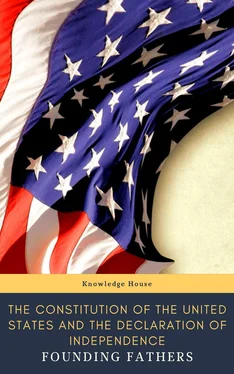ARTICLESin addition to, and Amendment of the Constitution of the United States of America, proposed by Congress, and ratified by the Legislatures of the several States, pursuant to the fifth Article of the original Constitution.
Article the first. .... After the first enumeration required by the first article of the Constitution, there shall be one Representative for every 30,000 until the number shall amount to 100, after which the proportion shall be so regulated by Congress, that there shall be not less than 100 Representatives, nor less than one Representative for every 40,000 persons, until the number of Representatives shall amount to 200; after which the proportion shall be so regulated by Congress, that there shall not be less than 200 Representatives, nor more than one Representative for every 50,000 persons.
Article the second ... No law, varying the compensation for the services of the Senators and Representatives, shall take effect, until an election of Representatives shall have intervened.
Article the third ...... Congress shall make no law respecting an establishment of religion, or prohibiting the free exercise thereof; or abridging the freedom of speech, or of the press; or the right of the people peaceably to assemble, and to petition the Government for a redress of grievances.
Article the fourth ..... A well regulated Militia, being necessary to the security of a free state, the right of the people to keep and bear arms, shall not be infringed.
Article the fifth ....... No soldier shall, in time of peace be quartered in any house, without the consent of the owner, nor in time of war, but in a manner to be prescribed by law.
Article the sixth ...... The right of the people to be secure in their persons, houses, papers, and effects, against unreasonable searches and seizures, shall not be violated, and no Warrants shall issue, but upon probable cause, supported by Oath or affirmation, and particularly describing the place to be searched, and the persons or things to be seized.
Article the seventh .. No person shall be held to answer for a capital, or otherwise infamous crime, unless on a presentment or indictment of a Grand Jury, except in cases arising in the land or naval forces, or in the Militia, when in actual service in time of war or public danger; nor shall any person be subject for the same offence to be twice put in jeopardy of life or limb; nor shall be compelled in any criminal case to be a witness against himself, nor be deprived of life, liberty, or property, without due process of law; nor shall private property be taken for public use, without just compensation.
Article the eighth ... In all criminal prosecutions, the accused shall enjoy the right to a speedy and public trial, by an impartial jury of the State and district wherein the crime shall have been committed, which district shall have been previously ascertained by law, and to be informed of the nature and cause of the accusation; to be confronted with the witnesses against him; to have compulsory process for obtaining witnesses in his favor, and to have the Assistance of Counsel for his defense.
Article the ninth .. In suits at common law, where the value in controversy shall exceed twenty dollars, the right of trial by jury shall be preserved, and no fact tried by a jury, shall be otherwise re-examined in any Court of the United States, than according to the rules of the common law.
Article the tenth ..... Excessive bail shall not be required, nor excessive fines imposed, nor cruel and unusual punishments inflicted.
Article the eleventh .... The enumeration in the Constitution, of certain rights, shall not be construed to deny or disparage others retained by the people.
Article the twelfth ... The powers not delegated to the United States by the Constitution, nor prohibited by it to the States, are reserved to the States respectively, or to the people.”
ATTEST,
Frederick Augustus Muhlenberg Speaker of the House of Representatives John Adams , Vice-President of the United States, and President of the Senate.
John Beckley , Clerk of the House of Representatives. Sam A. Otis , Secretary of the Senate.
(1792-1991)
Table of Contents
AMENDMENT XI – Judicial Limits
AMENDMENT XII – Choosing the President, Vice-President
AMENDMENT XIII – Slavery Abolished
AMENDMENT XIV – Citizenship Rights
AMENDMENT XV – Race No Bar to Vote
AMENDMENT XVI – Status of Income Tax Clarified
AMENDMENT XVII – Senators Elected by Popular Vote
AMENDMENT XVIII – Liquor Abolished
AMENDMENT XIX – Women’s Suffrage
AMENDMENT XX – Presidential, Congressional Terms
AMENDMENT XXI – Amendment XVIII Replaced
AMENDMENT XXII – Presidential Term Limits
AMENDMENT XXIII – Presidential Vote for District of Columbia
AMENDMENT XXIV – Poll Tax Barred
AMENDMENT XXV – Presidential Disability and Succession
AMENDMENT XXVI – Voting Age Set to 18 Years
AMENDMENT XXVII – Limiting Congressional Pay Increases
AMENDMENT XI:
Judicial Limits
Table of Contents
(Ratified February 7, 1795)
The Judicial power of the United States shall not be construed to extend to any suit in law or equity, commenced or prosecuted against one of the United States by Citizens of another State, or by Citizens or Subjects of any Foreign State.
AMENDMENT XII:
Choosing the President, Vice-President
Table of Contents
(Ratified June 15, 1804)
The Electors shall meet in their respective states, and vote by ballot for President and Vice-President, one of whom, at least, shall not be an inhabitant of the same state with themselves; they shall name in their ballots the person voted for as President, and in distinct ballots the person voted for as Vice-President, and they shall make distinct lists of all persons voted for as President, and of all persons voted for as Vice-President and of the number of votes for each, which lists they shall sign and certify, and transmit sealed to the seat of the government of the United States, directed to the President of the Senate;
The President of the Senate shall, in the presence of the Senate and House of Representatives, open all the certificates and the votes shall then be counted.
The person having the greatest Number of votes for President, shall be the President, if such number be a majority of the whole number of Electors appointed; and if no person have such majority, then from the persons having the highest numbers not exceeding three on the list of those voted for as President, the House of Representatives shall choose immediately, by ballot, the President. But in choosing the President, the votes shall be taken by states, the representation from each state having one vote; a quorum for this purpose shall consist of a member or members from two-thirds of the states, and a majority of all the states shall be necessary to a choice. And if the House of Representatives shall not choose a President whenever the right of choice shall devolve upon them, before the fourth day of March next following, then the Vice-President shall act as President, as in the case of the death or other constitutional disability of the President.
The person having the greatest number of votes as Vice-President, shall be the Vice-President, if such number be a majority of the whole number of Electors appointed, and if no person have a majority, then from the two highest numbers on the list, the Senate shall choose the Vice-President; a quorum for the purpose shall consist of two-thirds of the whole number of Senators, and a majority of the whole number shall be necessary to a choice. But no person constitutionally ineligible to the office of President shall be eligible to that of Vice-President of the United States.
Читать дальше












